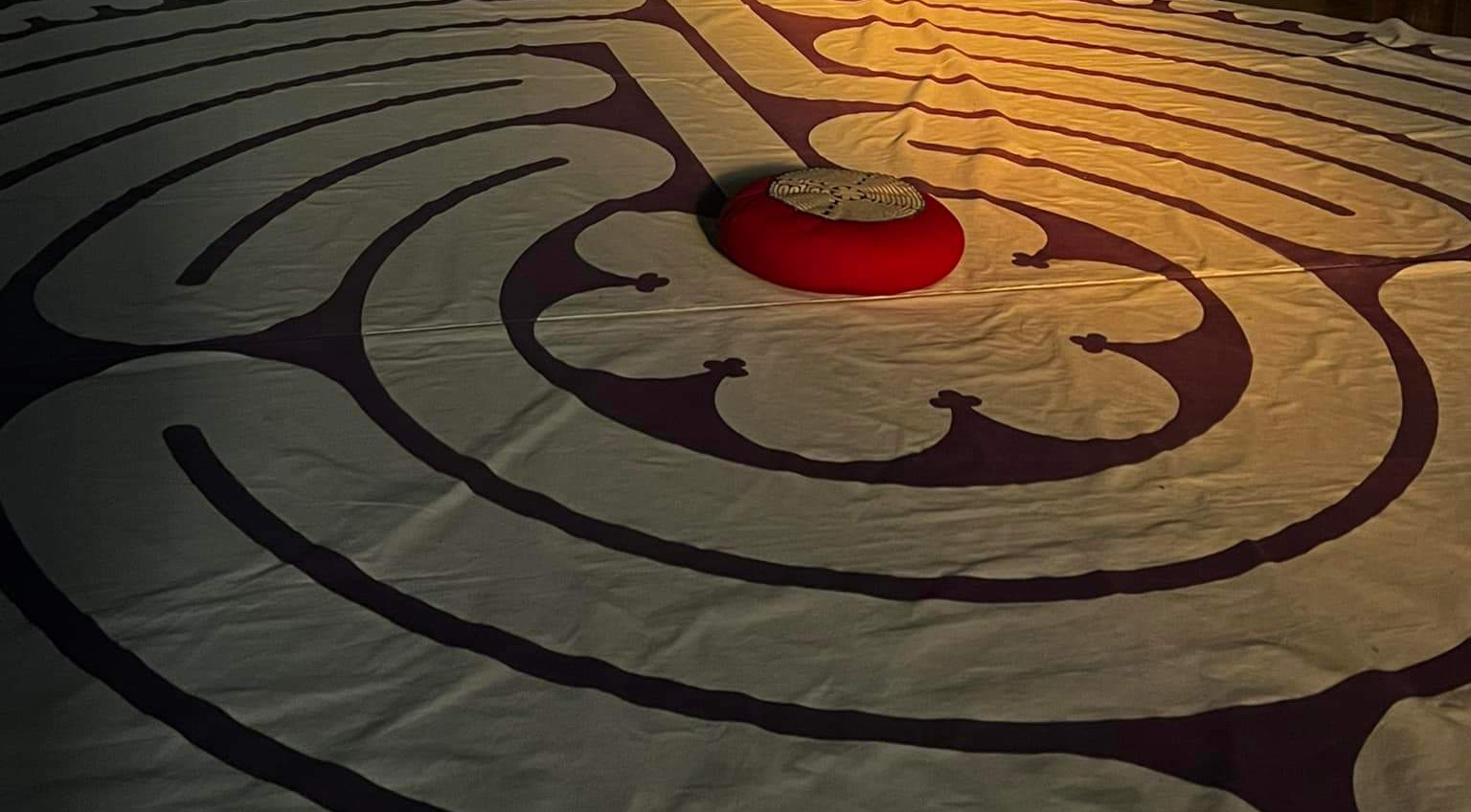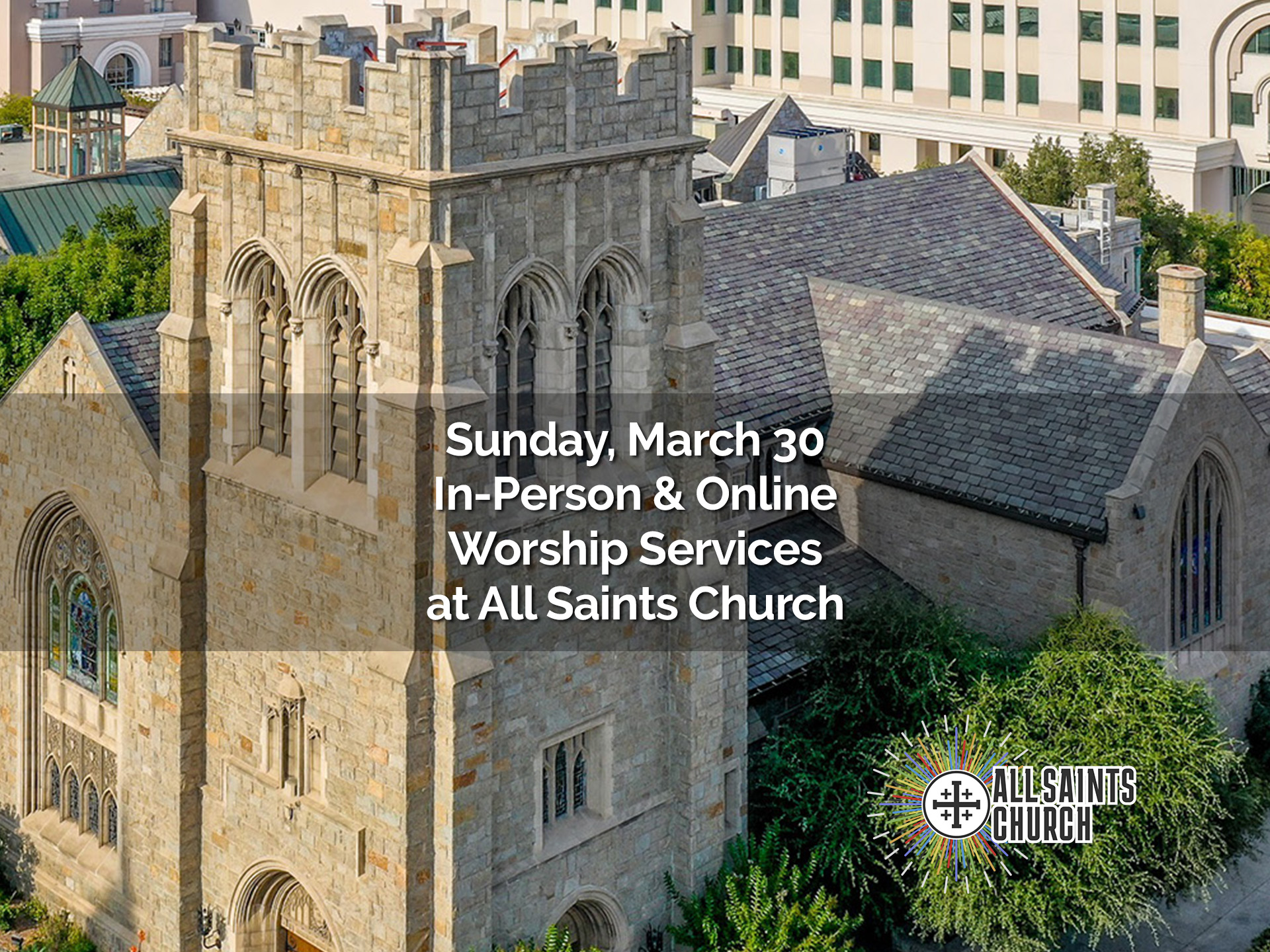A meditation for Monday in Holy Week by Mike Kinman, Rector of All Saints Church.
Mary brought a pound of costly ointment, pure nard, and anointed the feet of Jesus, wiping them with her hair. (John 12:3)
If there was ever a passage of scripture that should be read slowly, savoring each word, letting the images it evokes fully come to life … it is this one from the Gospel assigned to Monday in Holy Week.
John’s Gospel – and the way we usually read this verse – buzzes over this act so quickly, as if in embarrassment we can’t wait to get through it. We move so quickly to Judas, to the economic argument of the price of the oil, to the foretelling of Jesus’ death and burial.
Not so fast. Slow down. Easy, there.
Let’s take our time with this verse. Let’s dive deeply into what is happening here.
Everything about this scene is sensuous, erotic.
Everything about this scene is about the ecstasy, the joy, the holiness of sexual expression. The deep integration of our sexuality and our spirituality. The deep truth that we and Christ are embodied and that our bodies are wired to long for one another. That our sexuality is a divine gift and in truth part of the divine herself.
What happens between Mary and Jesus in this scene on pretty much every level is an expressive celebration of them as sexual beings. Even more, it is a bold, public and unashamed claiming of power by Mary … and when Judas tries to shame her, Jesus’ response is immediate and clear:
“Leave her alone.”
Mary’s first claim of power is economic. She takes the oil that is arguably the most valuable possession in the household, and she alone decides what to do with it. It is quite possibly the largest economic decision this family will make in years, and Mary claims her right to make it.
She uncorks the vial containing the ointment. And the scent flows out, reaching the nostrils of everyone in the room. They breathe in, and their senses come to life. Smell is the sense most connected to memory, and this ointment evokes memories of luxury, memories of the feeling of the deep scent being massaged into naked skin. The very smell of the ointment is the smell of passion, and in the mind it mixes with the other scents of passion, the other scents of bodies come alive in passion for one another that live in the corners of memory and fantasy.
Then Mary kneels before Jesus, her eyes looking up at him in love. She takes his feet in her hand. Maybe her touch is gentle. Maybe it is rough. Maybe both. It is surely passionate. It is surely not apathetic. Our feet are some of the most intimate parts of our body. They are tender and sensitive even when they are roughened by long journeys. Jesus’ feet are dusty and dirty, covered with evidence of his long journeys – and Mary doesn’t shy away from that. Neither does Mary shy away from the blisters and callouses that most certainly are there from the hundreds of miles he has walked. There is no shyness. There is no shame. There is only touch.
Then Mary pours the oil all over Jesus’ feet. All over them. The oil coats them and the excess, of which there is so much, splashes on the floor. The scent of the nard explodes into the room. It is overpowering. The act causes everyone in the room to gasp once, then gasp again when the scent reaches them. Not just Mary and Jesus but everyone, even those most offended by this act, cannot help but breathe in deeply, and the memories and fantasies that had been tantalizingly evoked come into full frame.
Then Mary begins to massage the oil deeply into Jesus’ feet. Another bold claim of power. Mary is clearly the dominant in this relationship. In front of Jesus, the rabbi, the teacher, she has taken control. Jesus is the submissive, he is literally in her hands. His is to receive.
And receive he does.
There are pressure points on the feet that correspond to every part of the body, inside and out. Mary’s hands touch them all. The lubrication of the oil brings their bodies – her hands, his feet – together. Her touch feels good. No, more than good, dancing on that edge of pleasureful pain and painful pleasure. Massages turn hard to soft and soft to hard. And with every caress, with every reception of every touch, there is love. Love flowing from Mary to Jesus. Love flowing from Jesus to Mary.
Time stands still. The massaging of feet goes on for several minutes, but it seems like hours. And all others in the room are silent. The kind of silence that comes when you know you are in the presence of something deeply intimate and holy. Did Martha and Judas look away? Did they watch? Did they wish it was them on the floor? In Jesus’ chair? If we truly trust a theology of incarnation and God so loving the whole world, we know that Jesus longed for Judas and Martha, too. Why did they not take part? There was no shame with Mary and Jesus, but was there shame with Martha and Judas? The text doesn’t tell us. But it begs the question …
Where is there shame for us?
Then Mary stops. Her finger trails off Jesus’ feet and, with her eyes fixed on his, she straightens up, reaches her arms over her head and, pausing just the briefest of seconds for Jesus and everyone else to wonder what will come next, Mary unbinds her hair, slowing removing her headscarf or untying her do. Again, this is a bold claiming of power – Mary refusing to cover her head, and in fact uncovering it in a way that is all about self-expression, uncovering it in a way that is all about asserting and celebrating a sexuality that her whole life she has been told to hide away in shame. Mary is in control. She has the power. And it is beautiful. It is holy. Jesus by his silence, Jesus by his submission, says so.
Mary rolls her neck slowly, then more quickly, loosening her luxurious hair around her, then she stops, and using only her neck she continues the massage of Jesus with her hair. It is an erotic dance, Mary’s upper body gyrating – it is the only way to get the motion of the hair necessary to do the task. But the task is not only the function of drying the feet, it is a celebration. A celebration of her love for Jesus. A celebration of Jesus’ love for her. A celebration of the freedom to express that love in ways that will no longer be bound by what others consider proper. A celebration of the freedom to express love that indeed presages Jesus’ crucifixion and death, because indeed it is Jesus’ refusal to let love be bound that was most threatening to the empire. It is Jesus’ refusal to let love be bound that made the empire realize he could not be controlled. And eventually, it is God’s refusal to let love be bound even by death that led to Mary finding not only the empty tomb but the living body of Jesus on Easter morning when she returned for what she thought was the conclusion of the anointing she had begun this day.
In her book Find Your Way Home, Becca Stevens names one of the 24 spiritual principles of Magdalene as “Unite Your Spirituality and Your Sexuality.” Becca writes:
We have been taught that our sexuality is a commodity and have learned to live in a spirit of mistrust and manipulation. In community we claim ourselves again, saying no to people and institutions that are not part of the healing of our bodies, minds, and spirits. We are sexual beings made in the image of God. We are spiritual beings made of flesh and bone. We are allowing one another the dignity of experiencing our spirituality and our sexuality.
Becca’s words cut to the heart of the power of this one verse, a verse we read much too quickly. A verse whose power we pass over much as Judas does and change the topic to suit our comfort and our shame.
We have been taught that our sexuality is a commodity. We have learned to live in a spirit of mistrust and manipulation. In this scene, Mary claims herself again. She claims her power. The power of her love. The power of her body. The power of her sexuality. The power of her gender. She fiercely casts aside the social mores of the day, the misogynistic standards of a patriarchal society that tells women to be ashamed of their sexuality, to hide it and to accept men’s control over it. She is free. And unashamed. And so is Jesus. And when Judas, the betrayer of love, objects, Jesus says:
Leave her alone.
Could there be a better way to begin this journey of Holy Week than with this Gospel? Where does this story touch you? Where does it touch your longings? Where does it touch your shame? Where does it invite you to unite your spirituality and your sexuality? Where does it call you to liberation and ecstasy and joy? Where does it call you to love one another as Christ loves us … given this bold, sensuous, erotic image of the Christ loving and receiving love?
Where does this story touch you? Where do you long to touch? Where do you long to be touched? Where do you long to hear Jesus shout down the voices of shame and say:
Leave her alone.
Leave him alone.
Leave them alone.
Mike Kinman is the Rector of All Saints Church.
For information on Holy Week and Easter services at All Saints Church click here.



